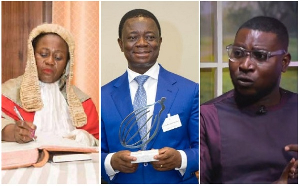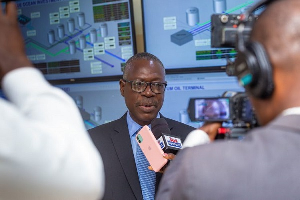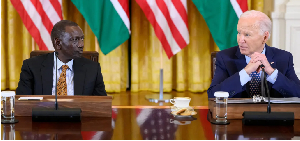- Home - News
- TWI News | TV
- Polls
- Year In Review
- News Archive
- Crime & Punishment
- Politics
- Regional
- Editorial
- Health
- Ghanaians Abroad
- Tabloid
- Africa
- Religion
- Election 2020
- Coronavirus
- News Videos | TV
- Photo Archives
- News Headlines
- Press Release
Crime & Punishment of Monday, 13 May 2024
Source: www.ghanaweb.com
Dr Opuni’s Trial: 'You’ve no power to interfere with the operations of a constituted panel' – ASEPA to Chief Justice
The Alliance for Social Equity and Public Accountability (ASEPA) has criticised the Chief Justice of Ghana, Justice Gertrude Torkonoo, following reports of abrupt changes in the Supreme Court panel handling the appeal of Dr. Stephen Opuni, the former COCOBOD Chief Executive Officer (CEO), and businessman Seidu Agongo.
In a statement issued on Monday, May 13, 2024, the civil society organisation indicated that abrupt changes in the panel presiding over the case of the former COCOBOD CEO by the Chief Justice amount to interference in the delivery of justice.
ASEPA added that the action of the Chief Justice is a violation of Article 157(3) of the 1992 Constitution, which provides that, “... no person sitting in a Superior Court for the determination of any cause or matter shall, having heard the arguments of the parties to that cause or matter and before judgment is delivered, withdraw as a member of the court or tribunal, or as a member of the panel determining that cause or matter, nor shall that person become functus officio in respect of that cause or matter, until judgment is delivered.
“We find it extremely unusual that a panel would be reconstituted in such fundamental terms without an explanation from the Court. In our view, the sudden move raises the possibility of judicial interference, undermines judicial independence, and casts a negative slur on the administration of justice,” part of the statement signed by the Executive Director of ASEPA, Mensah Thompson, reads.
“We remind the Chief Justice that her power to empanel is not a constitutional power. It is exercised as a result of the Court’s norms. Furthermore, she has no power to interfere with the operations of a constituted panel. Therefore, if she reshuffled the Opuni panel, then she acted ultra vires the Constitution. We have no doubt that the reshuffling of panels is contra to Article 296, which calls for administrative powers to be exercised without caprice” it added.
The group also noted that “It is this propensity for abuse and interference that forms the basis of why ASEPA has always advocated for the amendment of the law to make the process of empanelment a purely administrative process, away from the quasi-political clutches of the Chief Justice and putting it right in the hands of the Registrar of the Supreme Court, who is a permanent officer of the Court.”
According to a report by theheraldghana.com, the panel for the case was changed on the day of judgment, leaving many legal experts, including Dr Opuni's counsel, Lawyer Samuel Codjoe, bewildered.
Both the legal team of the plaintiff and the accused persons had made their arguments before an earlier panel and submitted their written submissions, and were awaiting the judgment of the court.
The report indicated that the original panel, comprised of Justice Mariama Owusu (Presiding), Justices Yaw Darko Asare, Emmanuel Yonny Kulendi, George Kingsley Koomson, and Henry A. Kwofie, was changed.
The new panel was made up of Chief Justice Gertrude Torkonoo (Presiding), Justices Mariama Owusu, Henrietta Mensa-Bonsu, Yaw Darko Asare, and Ernest Gaewu.
Dr Opuni, businessman Seidu Agongo, and Agricult Ghana Limited are facing 27 charges, including defrauding by false pretences, wilfully causing financial loss to the state, corruption by public officers, and contravention of the Public Procurement Act.
Read the full statement by ASEPA below:
BAI/ ADG
Watch the latest episode of Everyday People below:
Ghana’s leading digital news platform, GhanaWeb, in conjunction with the Korle-Bu Teaching Hospital, is embarking on an aggressive campaign which is geared towards ensuring that parliament passes comprehensive legislation to guide organ harvesting, organ donation, and organ transplantation in the country.











